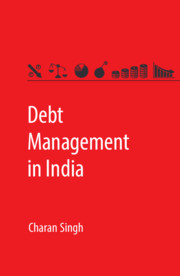Book contents
- Frontmatter
- Contents
- List of Tables and Figures
- Preface
- 1 Introduction
- 2 Public Debt in India
- 3 Ricardian Equivalence: Introduction
- 4 Ricardian Equivalence: Empirical Studies Utilising Consumption Function
- 5 Ricardian Equivalence and Consumption in India
- 6 Monetisation of Debt in India
- 7 Domestic Debt and Economic Growth in India
- 8 Separation of Debt from Monetary Management
- 9 Conclusions and Policy Implications
- Bibliography
- Index
1 - Introduction
Published online by Cambridge University Press: 23 November 2018
- Frontmatter
- Contents
- List of Tables and Figures
- Preface
- 1 Introduction
- 2 Public Debt in India
- 3 Ricardian Equivalence: Introduction
- 4 Ricardian Equivalence: Empirical Studies Utilising Consumption Function
- 5 Ricardian Equivalence and Consumption in India
- 6 Monetisation of Debt in India
- 7 Domestic Debt and Economic Growth in India
- 8 Separation of Debt from Monetary Management
- 9 Conclusions and Policy Implications
- Bibliography
- Index
Summary
Public debt as an important instrument of public finance policy is of a relatively recent origin, but has already assumed great significance. Though its origin can be traced back to war finance, it has only recently become an integral part of the fiscal and monetary policies of the developed as well as the developing countries. In the case of the developed economies, the implications of rising public debt have been analysed and critically evaluated. However, the economic literature on developing countries is lacking on this critical issue. The need for financial resources has led many developing countries to increasingly resort to public debt, in the context of public investment.
This study examines the economic impact of public debt in India. Public borrowing in India is a recognised source of public finance. The central and state governments derive the power to borrow from Articles 292 and 293 of the Indian Constitution, respectively. Article 292 of the Constitution empowers the union (federal) government to borrow on the security of the Consolidated Fund of India within such limits, if any, as may be fixed by the Parliament. Article 293 confers similar powers on the state governments within the limits fixed by the State Legislative Assemblies. States can only borrow domestically, whether from the centre or from other sources. However, if a state has any loans outstanding from the centre, or for which the centre is a guarantor, it must obtain the centre's consent before borrowing from any other source. As a consequence, in effect, almost all states today need union governments consent before they can borrow funds.
Under the Constitution of India, union government's debt is a ‘union subject’, while state government’ debt is a ‘state subject’, i.e., the centre cannot legislate how state governments should manage state borrowings. Article 246(1) of the Constitution read that Entries 35 and 37 of List I provides that Parliament has exclusive power to make laws regarding public debt of India and foreign loans. Article 246(3) of the Constitution read that Entry 43 of List II provides that state legislatures have exclusive power to make laws regarding the public debt of states. However, the Constitution limits sources from which state governments can borrow, and gives the centre power under certain circumstances to influence whether a state can borrow from sources other than the centre.
- Type
- Chapter
- Information
- Debt Management in India , pp. 1 - 7Publisher: Cambridge University PressPrint publication year: 2018



